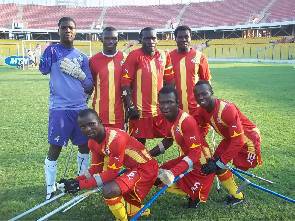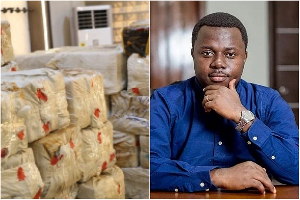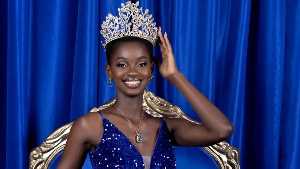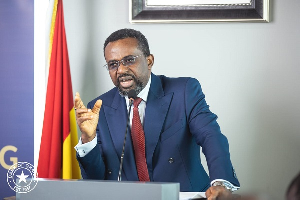Many people have heard of and might have seen it before but few would want to identify it by the name: three-legged game. This is because it has always been known as the game played by people with one leg.
The game in question is Amputee Football. Amputee football was a game that came about by accident and many of the players became players because they were one way or another involved in an accident.
Somewhere in 1980, Don Bennett, an American from Seattle, started the game of Amputee Football after he lost his leg to a propeller in a boat accident on a boating expedition.
Don Bennett was once watching his son play basketball when suddenly the ball rolled towards him on a driveway. Standing on his crutches without any prosthetics, he kicked the ball back to his son. It was at that point it occurred to him that he could, after all, play football on his crutches in spite of his disability.
He was more into skiing at that time, so while waiting for the skiing season, he and his colleagues played soccer with crutches and that was how the game of Amputee Football emerged and has become one of the patronized disability sports in the world with about fifty (50) countries actively involved in it.
Amputee Football is played with one leg with players using a pair of crutches as support though the deliberate touch of the ball with the crutches is a foul. It is played by six players per side in addition to a goalkeeper each whose amputation or disability is in one arm, leaving him with only one hand to catch the ball. The crutches do not only serve as a means of mobility for the players but are considered extra strength for persons considered as weaker or ‘disabled’ by their able-bodied counterparts. The crutches, therefore, give the notion of a game played with three legs instead of one leg as it is known for.
Since that accidental kick of the ball, many persons amputated or with disability in a leg such as Polio victims, have been playing amputee football and in countries like Turkey, Poland, England, Argentina, Liberia, Sierra Leone Mexico and more, an amputee football league is in place, engaging amputees in the sport of their heart.
In Ghana, Amputee Football might not be a household name due to the phenomenon of lesser funding for other sports besides able football, but the game has caught up with many enthusiasts and more importantly, has changed the destinies of many amputees and their families.
Many of the amputee football players in Ghana joined the game after surviving accidents that took away one of their limbs or arms or damaged it beyond productive use.
Apart from being a rehabilitative game that helps accident victims and other Persons with Disability (PWDs) to get back on the road of life, it has become a veritable source of income for some Ghanaians today with far-reaching multiplier benefits.
Currently, Ghana has twelve (12) amputee football players in the Turkish Amputee Football League after chalking the enviable record of being the first nation in the world to professionally transfer amputee footballer in the world.
In the year 2011, three members of the Ghana National Amputee Football team, the Black Challenge, namely Richard Arthur Opentil (Captain), Francis Antwi Darkwah (Deputy) and Attah Yeboah (member) had the rare privilege of being signed on by two Turkish clubs. The Captain and his deputy were engaged by Yenimahalle Amputee Football Club whilst Yeboah went to Konya Amputee Football club at a time the phenomenon of professionally transferring players was non-existent in the history of the game.
This feat was achieved after a successful participation in the Amputee Football World Cup in Argentina in 2010. Ghana became the first African nation to make it to the quarter finals stage of the competition and placed sixth. The Black Challenge’s sterling performance against nations like El Salvador, Liberia and Turkey, left an indelible mark in the minds of enthusiasts, especially against the Turkish team with all the resources and a two-tier league competition in their country. Ghana drew 1-1 with them at the group stage and the second round in games they had to come from behind to equalize in dying embers of the game.
After the transfer of the three players, the floodgates were opened for more Ghanaian players to go to Turkey to play in their league. Richard Ekwam and Collins Gyamfi have joined Attah Yeboah at Konya. The other players are Hamza Mohammed, Mubarak Mohammed, Cephas Anum, Kelvin Kofi Asare, Fuseinin Iddi and Joseph Amoh.
These players have taken the care-taking burden off the heads of their families in a country where PWDs are perceived in many places as parasites rather than contributors to the socio-economic development of the country. Instead, they have become bread winners for their wives and children through regular remittances. Certainly, this has become possible through the magic of a lesser-funded three-legged game called Amputee Football.
Unfortunately, in spite of this marvelous achievement, the authorities in the sports and disability sector have not seen the need to invest more into the game to make it more useful to society. The leaders of Amputee Football keep on lamenting the lack of support for the game ever since it gained true recognition in the early 2000s.
It is worthy of notice that the sport placed Ghana on the map of Africa as the first African Champions when the Black Challenge won the first ever Cup of African Nations for Amputee Football (CANAF) in Sierra Leone in 2007. The team failed to attend the second in event in Liberia in 2009 but managed to host the 3rd CANAF in Accra in 2011 where they won the silver medal after losing to Liberia, Champions in the 2nd edition. Ghana placed 3rd in the 4th CANAF in Kenya in 2013.
At the individual level, Richard Arthur Opentil won the Amputee Football Champions League of the World in Russia in 2013 whilst the rest have won various league titles and other laurels in Turkey, making a good mark for the nation.
At the international front, after placing the record-setting performance at the World Cup in Argentina, Ghana once again reached the quarter finals and placed sixth at the 2012 World Cup in Russia. However, due to some misunderstandings and lack of funding, the Black Challenge arrived late in Mexico for the 2014 World Cup so couldn’t feature competitively. Despite that, they beat Mexico 9-0 and Japan 6-2 in friendlies alongside the competition.
The negative attitude towards disability issues and lack of funding for the sport are really hampering the development of its full potentials.
For instance, in 2010 the Black Challenged, billed to leave Accra on October 12 for Argentina, had to leave on the day the competition started on October 16. As a result, they were made to play two matches on the same day (El Salvador and Liberia). It took the intervention of a philanthropist who pre-financed the trip for the team to be able to attend.
Similarly, in 2007, the defending Champions arrived late in Turkey for the World Cup so just had to play some friendlies. The trend was the same in 2012 except that, after persistent appeals from leadership, the government came in at the last minute to salvage the trip.
Considering the fact that the 2010 World Cup in Argentina opened the door for the transfer of the twelve players, one would ask, what would have happened to this great opportunity if that philanthropist had not pre-financed the trip? The case for more support for disability sports is far stronger than any excuse the authorities can give for not supporting it.
Amputee Football has contributed to the international image of the economic development of the nation in its small way. It has changed the lives of players who would have become parasites feeding on the crumbs that fall from the table of some privileged ones; but the game has turned them into bread winners and potent contributors to national development.
Some pf the players in Turkey are also engaged in training programmes to make them self-sufficient should they decide to opt out of the sport. Richard Arthur Opentil is currently learning the act of producing prosthetics, a profession he wants to use to improve on the mobility of his colleagues when he eventually sets up a centre here in Ghana in the future.
A lot more is being done as a result of the opportunities created by the three-legged sport.
Next time you see amputees playing football, support it in any way possible for that could be your way of contributing to the three-legged game that is changing lives.
Sports Features of Thursday, 22 December 2016
Source: theodore mawuli k. viwotor
The life-changing three-legged game
 Amputee Football
Amputee Football












